(完整版)7A牛津译林版各单元重点知识点
- 格式:doc
- 大小:106.01 KB
- 文档页数:8
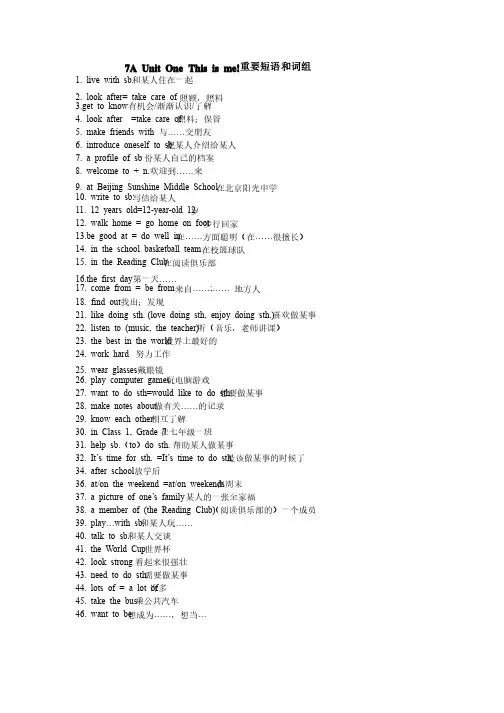
7A Unit One This is me!重要短语和词组 1. live with sb. 和某人住在一起和某人住在一起2. look after= take care of 照顾,照料照顾,照料3.get to know 有机会有机会/渐渐认识/了解了解4. look after =take care of 照料;保管照料;保管5. make friends with 与……交朋友交朋友6. introduce oneself to sb 把某人介绍给某人把某人介绍给某人7. a profile of sb 一份某人自己的档案一份某人自己的档案8. welcome to + n. 欢迎到……来9. at Beijing Sunshine Middle School 在北京阳光中学在北京阳光中学 10. write to sb. 写信给某人写信给某人11. 12 years old=12-year-old 12岁12. walk home = go home on foot 步行回家步行回家13.be good at = do well in 在……方面聪明(在……很擅长)很擅长)14. in the school basketball team 在校篮球队在校篮球队15. in the Reading Club 在阅读俱乐部在阅读俱乐部16.the first day 第一天第一天……17. come from = be from 来自……;…… 地方人地方人18. find out 找出;发现找出;发现找出;发现 21. like doing sth. (love doing sth, enjoy doing sth.) 喜欢做某事喜欢做某事22. listen to (music, the teacher) 听(音乐,老师讲课)听(音乐,老师讲课)23. the best in the world 世界上最好的世界上最好的24. work hard 努力工作努力工作25. wear glasses 戴眼镜戴眼镜戴眼镜 26. play computer games 玩电脑游戏玩电脑游戏玩电脑游戏 27. want to do sth=would like to do sth. 想要做某事想要做某事28. make notes about 做有关……的记录的记录29. know each other 相互了解相互了解30. in Class 1, Grade 7 在七年级一班在七年级一班31. help sb. (to )do sth. 帮助某人做某事帮助某人做某事32. It’s time for sth. =It’s time to do sth. 是该做某事的时候了是该做某事的时候了34. after school 放学后放学后放学后 36. at/on the weekend =at/on weekends 在周末在周末37. a picture of one’s family 某人的一张全家福某人的一张全家福38. a member of (the Reading Club) (阅读俱乐部的)一个成员(阅读俱乐部的)一个成员39. play…with sb.和某人玩…… 40. talk to sb. 和某人交谈和某人交谈41. the World Cup 世界杯世界杯42. look strong 看起来很强壮看起来很强壮43. need to do sth. 需要做某事需要做某事44. lots of = a lot of 许多许多45. take the bus 乘公共汽车乘公共汽车46. want to be 想成为想成为……,想当…Unit 2 Let’s play sports 重要短语和词组1. Let’s play sports 让我们进行体育运动吧让我们进行体育运动吧2. Do you like any sports? 你喜欢运动吗?你喜欢运动吗?3. like walking 喜欢散步喜欢散步4. Really? 真的吗真的吗5. walk to my bowl 走到我的碗边走到我的碗边6. many times a day 一天许多次一天许多次7. play volleyball 打排球打排球8. play tennis 打网球打网球9. play football 踢足球踢足球 10. enjoy swimming 喜欢游泳喜欢游泳喜欢游泳 11. What’s your favorite sport? 你最喜欢的运动是什么?你最喜欢的运动是什么?12. like doing sth 喜欢作某事喜欢作某事13. after school 放学以后放学以后14. what about you ?=How about you? 你怎么样?你怎么样?15. go swimming 去游泳去游泳16. every week 每周每周17. love sports 爱运动爱运动18 .very much 非常非常19. my favorite football player/star 我特别喜爱的足球运动员/明星明星20. 22 years old 22岁21. a new member of 一名新成员一名新成员2.2 Huanghe Football Club 黄河足球俱乐部黄河足球俱乐部23. come from Guangdong 来自广东来自广东24. live in Beijing 住在北京住在北京25. look strong 看上去很壮看上去很壮26. play football very well 足球踢得好足球踢得好27. in his free time 在他空余时间在他空余时间28. study English 学英语学英语29. enjoy listening to music 喜欢听音乐喜欢听音乐30. make sb happy 使某人开心使某人开心 make sb feel great使某人感觉棒 31. want to do sth =would like to do sth 想做某事想做某事32. play in the next World Cup 踢进下次世界杯踢进下次世界杯33. hope his dream comes true 希望他梦想成真希望他梦想成真34. a lot of interesting books 许多有趣的书许多有趣的书35. get up 起床起床36. watch ball games/matches 看球赛看球赛37. after-school activities 课外活动课外活动课外活动 38. . my hero 我的偶像。
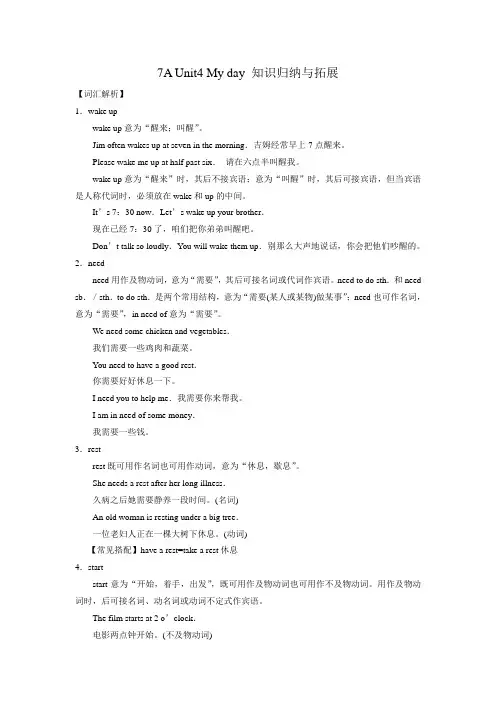
7A Unit4 My day 知识归纳与拓展【词汇解析】1.wake upwake up意为“醒来;叫醒”。
Jim often wakes up at seven in the morning.吉姆经常早上7点醒来。
Please wake me up at half past six.请在六点半叫醒我。
wake up意为“醒来”时,其后不接宾语;意为“叫醒”时,其后可接宾语,但当宾语是人称代词时,必须放在wake和up的中间。
It’s 7:30 now.Let’s wake up your brother.现在已经7:30了,咱们把你弟弟叫醒吧。
Don’t talk so loudly.You will wake them up.别那么大声地说话,你会把他们吵醒的。
2.needneed用作及物动词,意为“需要”,其后可接名词或代词作宾语。
need to do sth.和need sb./sth.to do sth.是两个常用结构,意为“需要(某人或某物)做某事”;need也可作名词,意为“需要”,in need of意为“需要”。
We need some chicken and vegetables.我们需要一些鸡肉和蔬菜。
You need to have a good rest.你需要好好休息一下。
I need you to help me.我需要你来帮我。
I am in need of some money.我需要一些钱。
3.restrest既可用作名词也可用作动词,意为“休息,歇息”。
She needs a rest after her long illness.久病之后她需要静养一段时间。
(名词)An old woman is resting under a big tree.一位老妇人正在一棵大树下休息。
(动词)【常见搭配】have a rest=take a rest休息4.startstart意为“开始,着手,出发”,既可用作及物动词也可用作不及物动词。
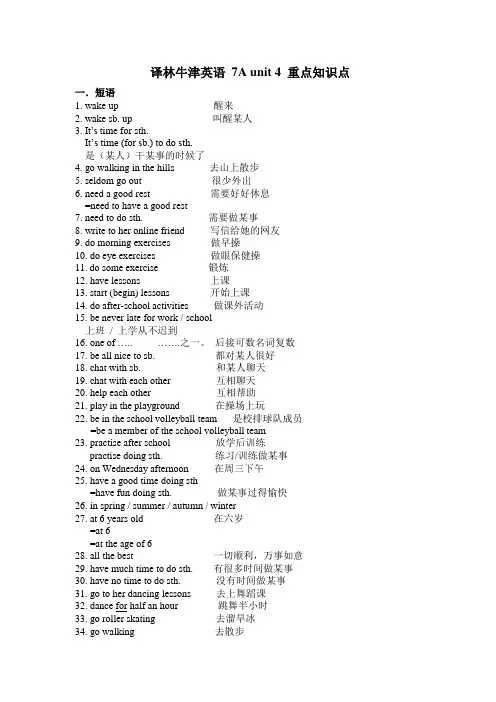
译林牛津英语7A unit 4 重点知识点一.短语1.wake up 醒来2.wake sb. up 叫醒某人3.It’s time for sth.It’s time (for sb.) to do sth.是(某人)干某事的时候了4.go walking in the hills 去山上散步5.seldom go out 很少外出6.need a good rest 需要好好休息=need to have a good rest7.need to do sth. 需要做某事8.write to her online friend 写信给她的网友9.do morning exercises 做早操10.do eye exercises 做眼保健操11.do some exercise 锻炼12.have lessons 上课13.start (begin) lessons 开始上课14.do after-school activities 做课外活动15.be never late for work / school上班/ 上学从不迟到16.one of …..…….之一。
后接可数名词复数17.be all nice to sb. 都对某人很好18.chat with sb. 和某人聊天19.chat with each other 互相聊天20.help each other 互相帮助21.play in the playground 在操场上玩22.be in the school volleyball team 是校排球队成员=be a member of the school volleyball team23.practise after school 放学后训练practise doing sth. 练习/训练做某事24.on Wednesday afternoon 在周三下午25.have a good time doing sth=have fun doing sth. 做某事过得愉快26.in spring / summer / autumn / winter27.at 6 years old 在六岁=at 6=at the age of 628.all the best 一切顺利,万事如意29.have much time to do sth. 有很多时间做某事30.have no time to do sth. 没有时间做某事31.go to her dancing lessons 去上舞蹈课32.dance for half an hour 跳舞半小时33.go roller skating 去溜旱冰34.go walking 去散步35.between...and... 在...和...之间36.visit a museum 参观博物馆37.go on picnics with my family twice a month一个月两次和我家人去野餐38.at noon 在中午39.at night 在夜里40.at work 在工作41.be good for sb. 对...有益42.be bad for sb. 有…..害43.help sb. get ready for sth 帮助某人为...做好准备44.get ready to do sth 准备好做某事=be ready to do sth.45.learn a lot about sth 关于某事了解很多46.learn more about sth. 关于某事了解更多47.too much homework 太多作业48.too many lessons 太多课49.much too cold (hot)太冷(热)二.重要句子:1.Some dogs just don’t know how to have fun. 有些狗就是不知道怎样玩乐。
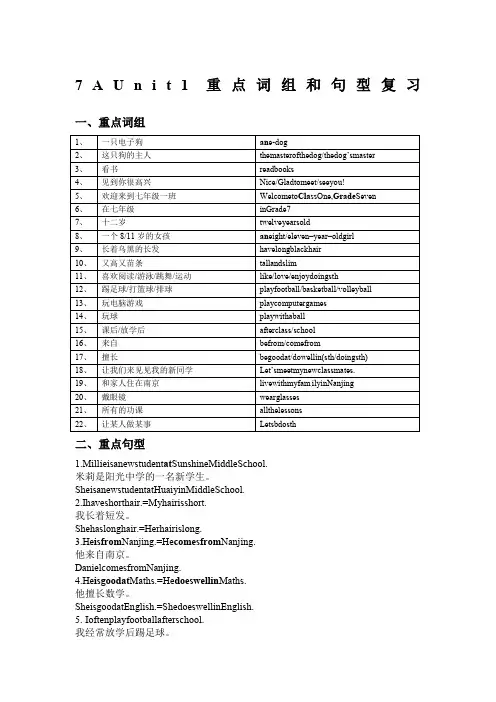
7A U n i t1重点词组和句型复习一、重点词组1、一只电子狗an e-dog2、这只狗的主人themasterofthedog/thedog’smaster3、看书readbooks4、见到你很高兴Nice/Gladtomeet/seeyou!5、欢迎来到七年级一班Welcometo Class One,Grade Seven6、在七年级inGrade77、十二岁twelveyearsold8、一个8/11岁的女孩an eight/eleven–year–oldgirl9、长着乌黑的长发havelongblackhair10、又高又苗条tallandslim11、喜欢阅读/游泳/跳舞/运动like/love/enjoydoingsth12、踢足球/打篮球/排球playfootball/basketball/volleyball13、玩电脑游戏playcomputergames14、玩球playwithaball15、课后/放学后afterclass/school16、来自befrom/comefrom17、擅长begoodat/dowellin(sth/doingsth)18、让我们来见见我的新同学Let’smeetmynewclassmates.19、和家人住在南京livewithmyfam ilyinNanjing20、戴眼镜wearglasses21、所有的功课allthelessons22、让某人做某事Letsbdosth二、重点句型lieisanewstudent at SunshineMiddleSchool.米莉是阳光中学的一名新学生。
SheisanewstudentatHuaiyinMiddleSchool.2.Ihaveshorthair.=Myhairisshort.我长着短发。
Shehaslonghair.=Herhairislong.3.He isfrom Nanjing.=He comesfrom Nanjing.他来自南京。
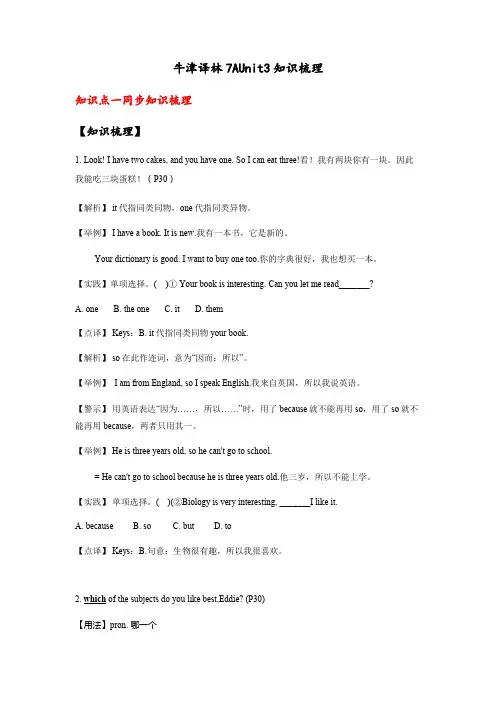
牛津译林7AUnit3知识梳理知识点一同步知识梳理【知识梳理】1. Look! I have two cakes, and you have one. So I can eat three!看!我有两块你有一块。
因此我能吃三块蛋糕!(P30)【解析】 it代指同类同物,one代指同类异物。
【举例】 I have a book. It is new.我有一本书,它是新的。
Your dictionary is good. I want to buy one too.你的字典很好,我也想买一本。
【实践】单项选择。
( )① Your book is interesting. Can you let me read_______?A. oneB. the oneC. itD. them【点译】 Keys:B. it代指同类同物your book.【解析】 so在此作连词,意为“因而;所以”。
【举例】 I am from England, so I speak English.我来自英国,所以我说英语。
【警示】用英语表达“因为……,所以……”时,用了because就不能再用so,用了so就不能再用because,两者只用其一。
【举例】 He is three years old, so he can't go to school.= He can't go to school because he is three years old.他三岁,所以不能上学。
【实践】单项选择。
( )(②Biology is very interesting, _______I like it.A. becauseB. soC. butD. to【点译】 Keys:B.句意:生物很有趣,所以我很喜欢。
2. which of the subjects do you like best,Eddie? (P30)【用法】pron. 哪一个【举例】It's hard to say which is better.很难说哪一个好些。
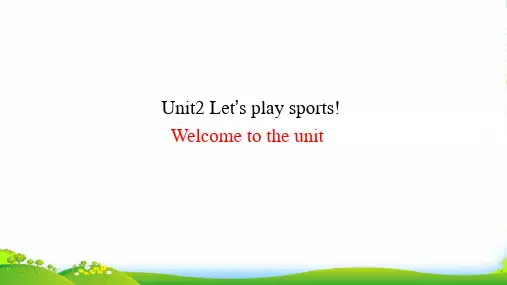
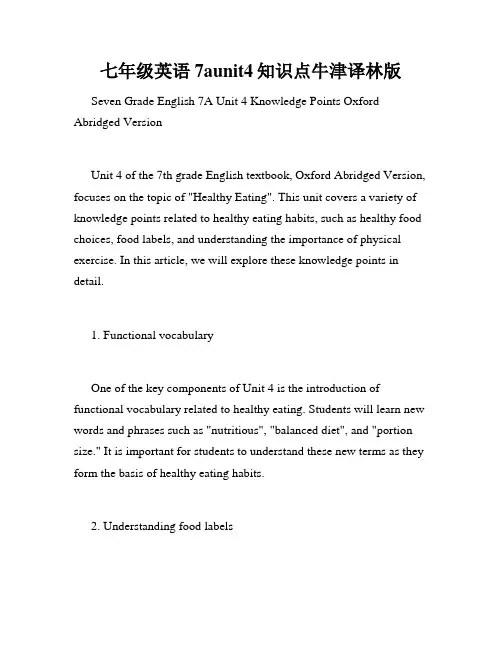
七年级英语7aunit4知识点牛津译林版Seven Grade English 7A Unit 4 Knowledge Points Oxford Abridged VersionUnit 4 of the 7th grade English textbook, Oxford Abridged Version, focuses on the topic of "Healthy Eating". This unit covers a variety of knowledge points related to healthy eating habits, such as healthy food choices, food labels, and understanding the importance of physical exercise. In this article, we will explore these knowledge points in detail.1. Functional vocabularyOne of the key components of Unit 4 is the introduction of functional vocabulary related to healthy eating. Students will learn new words and phrases such as "nutritious", "balanced diet", and "portion size." It is important for students to understand these new terms as they form the basis of healthy eating habits.2. Understanding food labelsAnother important knowledge point covered in this unit is how to read food labels. Students will learn how to identify the different types of nutrients, such as fat, salt, and sugar, and how to understand their measurements. By being able to read food labels, students can make informed decisions about their food choices.3. Healthy food choicesUnit 4 also covers the importance of making healthy food choices. Students will learn about the food groups, such as fruits and vegetables, carbohydrates, proteins, and fats, and the essential nutrients found in each group. By understanding the importance of a balanced diet and the nutrients required for healthy living, students can make better food choices.4. Exercise for a healthy lifestyleFinally, Unit 4 emphasizes the importance of physical exercise for a healthy lifestyle. Students will learn about the different types of exercise and their benefits, such as cardio, strength training, and flexibility exercises. By understanding the different types of exercise and their benefits, students can make informed decisions about their physical activity.ConclusionUnit 4 of the 7th-grade English textbook, Oxford Abridged Version, covers a variety of knowledge points related to healthy eating habits and physical exercise. By understanding functional vocabulary, reading food labels, making healthy food choices, and incorporating physical activity into their daily routine, students can develop a healthy lifestyle. By following these knowledge points, students can maintain their physical and mental health and achieve greater success in their academic and personal lives.。
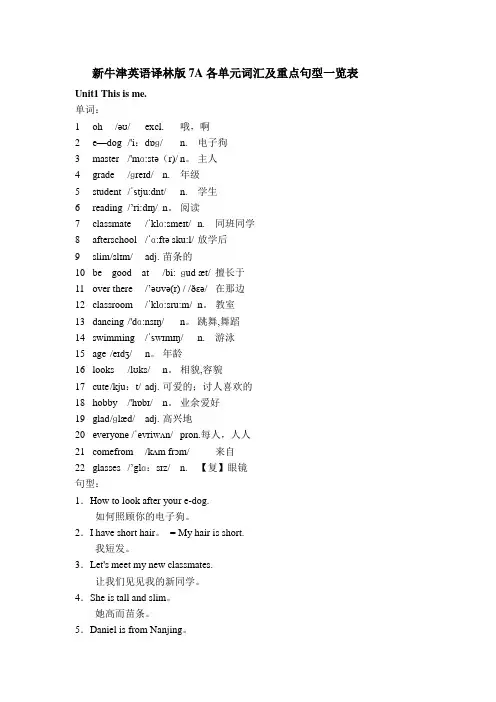
新牛津英语译林版7A各单元词汇及重点句型一览表Unit1 This is me.单词:1 oh /əʊ/ excl. 哦,啊2 e—dog /'i:dɒɡ/ n. 电子狗3 master /'mɑ:stə(r)/ n。
主人4 grade /ɡreɪd/ n. 年级5 student /ˈstju:dnt/n. 学生6 reading /’ri:dɪŋ/n。
阅读7 classmate /ˈklɑ:smeɪt/ n. 同班同学8 afterschool /ˈɑ:ftə sku:l/ 放学后9 slim /slɪm/ adj. 苗条的10 be good at /bi: ɡud æt/ 擅长于11 over there /’əʊvə(r) / /ðεə/ 在那边12 classroom /ˈklɑ:sru:m/ n。
教室13 dancing /'dɑ:nsɪŋ/n。
跳舞,舞蹈14 swimming /ˈswɪmɪŋ/n. 游泳15 age /eɪdʒ/ n。
年龄16 looks /lʊks/ n。
相貌,容貌17 cute /kju:t/ adj. 可爱的;讨人喜欢的18 hobby /'hɒbɪ/ n。
业余爱好19 glad /ɡlæd/ adj. 高兴地20 everyone /ˈevriwʌn/ pron.每人,人人21 comefrom /kʌm frɔm/ 来自22 glasses /’glɑ:sɪz/ n. 【复】眼镜句型:1.How to look after your e-dog.如何照顾你的电子狗。
2.I have short hair。
= My hair is short.我短发。
3.Let's meet my new classmates.让我们见见我的新同学。
4.She is tall and slim。
她高而苗条。
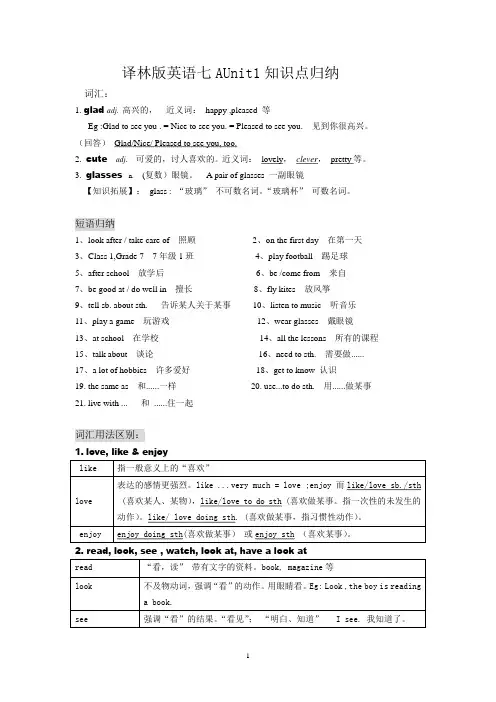
译林版英语七AUnit1知识点归纳词汇:1. glad adj. 高兴的,近义词:happy ,pleased 等Eg :Glad to see you . = Nice to see you. = Pleased to see you. 见到你很高兴。
(回答)Glad/Nice/ Pleased to see you, too.2. cute adj. 可爱的,讨人喜欢的。
近义词:lovely,clever,pretty等。
3. glasses n.(复数)眼镜。
A pair of glasses 一副眼镜【知识拓展】:glass : “玻璃”不可数名词。
“玻璃杯”可数名词。
短语归纳1、look after / take care of 照顾2、on the first day 在第一天3、Class 1,Grade 7 7年级1班4、play football 踢足球5、after school 放学后6、be /come from 来自7、be good at / do well in 擅长8、fly kites 放风筝9、tell sb. about sth. 告诉某人关于某事10、listen to music 听音乐11、play a game 玩游戏12、wear glasses 戴眼镜13、at school 在学校14、all the lessons 所有的课程15、talk about 谈论16、need to sth. 需要做...... 17、a lot of hobbies 许多爱好18、get to know 认识19. the same as 和......一样20. use...to do sth. 用......做某事21. live with ... 和......住一起词汇用法区别:1.love, like & enjoy2. read, look, see , watch, look at, have a look at本单元应该掌握的句子:1.What’s your name?你叫什么名字?2.Nice to meet you! 很高兴见到你。
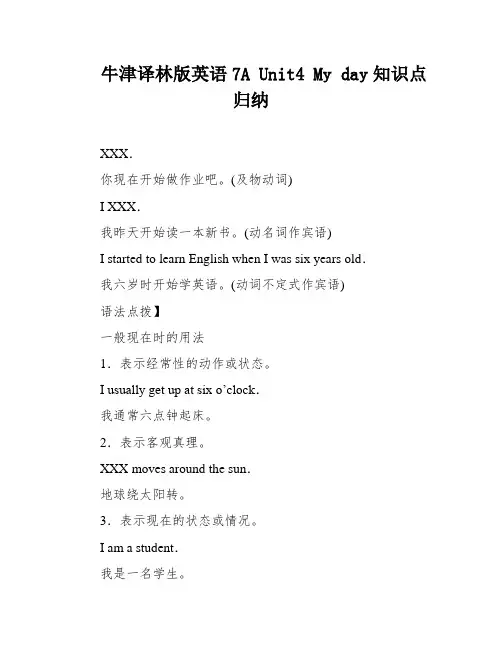
牛津译林版英语7A Unit4 My day知识点归纳XXX.你现在开始做作业吧。
(及物动词)I XXX.我昨天开始读一本新书。
(动名词作宾语)I started to learn English when I was six years old.我六岁时开始学英语。
(动词不定式作宾语)语法点拨】一般现在时的用法1.表示经常性的动作或状态。
I usually get up at six o’clock.我通常六点钟起床。
2.表示客观真理。
XXX moves around the sun.地球绕太阳转。
3.表示现在的状态或情况。
I am a student.我是一名学生。
4.表示将来。
XXX.明天早上六点火车开。
5.表示命令、建议、邀请等。
Don’t smoke in the office.办公室里不准吸烟。
Let’s have a walk after supper.晚饭后我们去散步吧。
6.表示评论、描写、说明等。
This book tells us a lot about Chinese history.这本书向我们讲述了很多中国历史。
写作指导】本文主要介绍了一些常用的词汇及语法点,如动词的用法、时态等。
在写作中,要注意正确使用这些词汇和语法点,以使文章表达准确、流畅。
同时,也要注意文章的格式,如段落的分隔等。
We learn English in school。
It's never too late to learn。
Common phrases with "learn" include "learn about" and "learn from." "Learn" emphasizes the act of learning and acquiringknowledge。
while "learn about" emphasizes gaining n and understanding.Just learning about English doesn't mean you've learned the language。
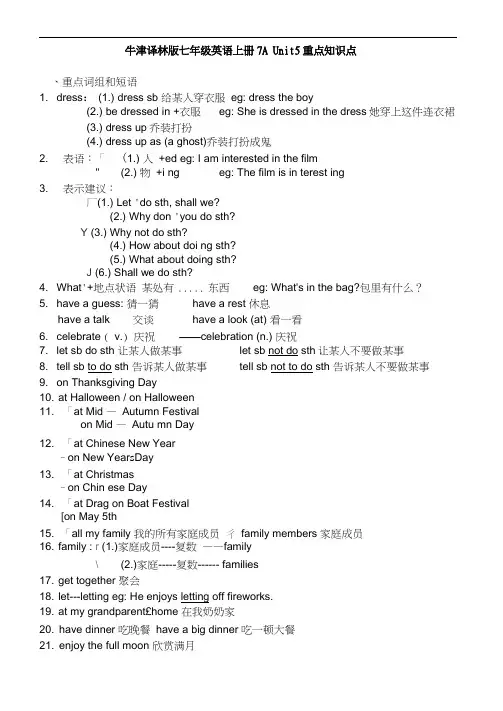
牛津译林版七年级英语上册7A Unit5重点知识点、重点词组和短语1. dress: (1.) dress sb 给某人穿衣服eg: dress the boy(2.) be dressed in +衣服eg: She is dressed in the dress她穿上这件连衣裙(3.) dress up乔装打扮(4.) dress up as (a ghost)乔装打扮成鬼2. 表语:「(1.) 人+ed eg: I am interested in the film" (2.) 物+i ng eg: The film is in terest ing3. 表示建议:厂(1.) Let 'do sth, shall we?(2.) Why don 'you do sth?Y (3.) Why not do sth?(4.) How about doi ng sth?(5.) What about doing sth?J (6.) Shall we do sth?4. What'+地点状语某处有..... 东西eg: What's in the bag?包里有什么?5. have a guess: 猜一猜have a rest 休息have a talk 交谈have a look (at) 看一看6. celebrate ( v.) 庆祝——celebration (n.) 庆祝7. let sb do sth 让某人做某事let sb not do sth让某人不要做某事8. tell sb to do sth 告诉某人做某事tell sb not to do sth 告诉某人不要做某事9. on Thanksgiving Day10. at Halloween / on Halloween11. 「at Mid —Autumn Festivalon Mid —Autu mn Day12. 「at Chinese New Year_ on New Year s Day13. 「at Christmas_ on Chin ese Day14. 「at Drag on Boat Festival[on May 5th15. 「all my family 我的所有家庭成员彳family members 家庭成员16. family : r (1.)家庭成员----复数——family\ (2.)家庭-----复数------ families17. get together 聚会18. let---letting eg: He enjoys letting off fireworks.19. at my grandparent£home 在我奶奶家20. have dinner 吃晚餐have a big dinner 吃一顿大餐21. enjoy the full moon 欣赏满月(1.)满的,充满的----empty空的be full of / be filled with 充满22. full:eg: The basket is full of flowers. / The basket is filled with flowers. (2.)饱的——hun gry23. because与so在一个主从复合句中,只能用其中一个。
牛津译林版英语7A Unit7 Music 知识归纳与拓展本文档旨在对牛津译林版英语7A Unit7 Music的知识进行归纳和拓展。
以下是对该单元内容的总结:一、词汇研究1. Musical Instruments(乐器):钢琴(piano)、吉他(guitar)、小提琴(violin)、长笛(flute)等。
2. Music Genres(音乐流派):古典音乐(classical music)、摇滚音乐(rock music)、流行音乐(pop music)等。
二、语法研究1. The Present Simple Tense(一般现在时):用于描述惯动作或常态。
例如:I play the piano every day.2. Adjectives(形容词):用于描述乐器或音乐的特征。
例如:She is a talented violinist.三、常见表达1. Talking about likes and dislikes(谈论喜欢和不喜欢):例如:I love classical music. I don't like rap music.2. Making suggestions(提出建议):例如:You should listen to some jazz music. It's really relaxing.3. Describing personal experiences(描述个人经历):例如:I have been to a live concert before. It was amazing!四、拓展知识1. Famous Musicians(知名音乐家):例如:Ludwig van Beethoven(贝多芬)、Freddie Mercury(弗雷迪·默丘里)等。
2. Music History(音乐历史):例如:Baroque(巴洛克时期)、Romantic(浪漫主义时期)等。
Unit1 This is me一、词组二、句型和知识点:1、介绍自己:I am Amy. / My name is Simon。
2、介绍别人:This is…。
3、询问别人的名字What’s your name?回答:I’m….. / My name is…。
May I know your name? Yes,I’m…? Yes I am. / Sorry。
I’m Mr Brown。
4很高兴做某事 I'm nice / glad _________you. 很高兴见到你。
5Let me see / Let’s go now。
Let ______________。
让他进来吧。
6、她长着长发。
She _____ _____ _____。
= _______ ______ ______ long.7、提问外貌: What is he like? / What ______ he ______ _______?8、谈论国籍: Where _______ you from? / Where ______ you come from?I am from / come from China. = I am ____________。
He is from _______ . = He ______ from ______。
= He is ____________。
(他是英国人) She ________________。
= She __________________. (她来自美国。
)9、谈论出生地– be born——-——Where ______ you born? I ____________ in Nanjing。
10、谈论爱好:(1) like / love / enjoy doing sth(2) My hobby is playing football.(3)She is good at swimming. = She does well in dancing。
牛津译林版七年级英语上册7A Unit1 This is me!1.一只电子狗an e-dog2.你是我的主人吗?Are you my master?3.怎样照顾你的电子狗how to look after your e-dog (how to do sth. )4.和、、、交朋友make friends with5.第一天the first day 在二楼on the first floor6.互相each other 互相帮助help each other 互相聊天chat with each other7.晚上好Good evening 晚安Good night8.can(可以)+动词原形must (必须)+动词原形let(让)+动词原形why not (为什么不)+动词原形do/ does+动词原形help(帮助)+动词原形9.我12岁了。
I’m 12 years old.= I’m 12.一个12岁的女孩。
a 12-year-old girl10.在七年级一班in Class 1, Grade 711.我在阅读兴趣小组I’m in the Reading Club. = I’m a member of the Reading Club. Swimming Club游泳兴趣小组Drawing Club绘画兴趣小组12.我出生在上海。
I was born in Shanghai. = Shanghai is my birthplace.上海是我的出生地。
13.住在北京live in Beijing 和我的家人住在一起live with my family14喜欢在放学后踢足球.love playing football after school 喜欢听音乐like listening to music 喜欢玩电脑游戏enjoy playing computer games15.来自北京come from Beijing = be (am, is, are )from Beijing16.长着黑色的长发have long black hair17. 她学习刻苦she works hard. =she studies hard.18.她擅长游泳。
第四讲7A Unit 4 My day 复习讲义教学目标:1.能够熟练掌握本单元的重点单词、词组以及句型。
2.能够熟练掌握介词in、at、on 的用法和区别,并且学会运用。
3.牢记本单元的一些重要知识点。
教学重点: 介词in、at、on的具体运用。
教学内容:一、短语1.wake sb up 叫醒某人2. go out 出去3.have breakfast/lunch/dinner 吃早/中/晚饭4.have fun 玩的开心5.get up 起床6.have lessons 上课7.go to bed 去睡觉8.be late for ...迟到9.chat with sb 和某人聊天10.each other 相互11.have a good time 玩的开心12.all the best 一切顺利13.get ready for为……准备好14.need a good rest需要好好休息15.do morning exercises 做早操16.do after-school activities 做放学后的活动17.do homework 做家庭作业18.at a quarter past eight. 八点十五19.from Monday to Friday 从周一到周五二、知识点1.It is time for sth/ to do sth 到该做什么的时间到了。
2.have fun doing sth 高兴地做某事3.how to have fun 如何玩得高兴4.wish our team good luck.祝愿我们队好运。
5.have too much homework.有太多的家庭作业6.They are all nice to me. 他们对我很好三、句型背诵:1.Some dogs just don’t know how to have fun.2.I’m never late for school.3.After class, we often chat with each other or play in the playground.下课后,我们经常在一起聊天或者在操场上玩4.We practice after school on Wednesday afternoon.周三下午放学后我们一起训练5.Best wishes 美好的祝愿6.I like to go on picnics with my family.我喜欢跟我的家人聚餐。
7A 短语和句子n.名词v.动词vt.及物动词vi.不及物动词adj.形容词adv.副词prep.介词pron.代词conj.连词Unit 1 This is me!1. look after sb. (well) 好好照顾某人= take (good) care of sb.2. some of the new students 新学生中的一些one of + 可数名词复数…..中的一个many of + 可数名词复数…..中的许多much of + 不可数名词…..中的许多3. introduce A to B 把A介绍给B introduce yourself to the class把你自己介绍给全班myself yourself himself herself itself我自己你自己他自己她自己它自己ourselves yourselves themselves我们自己你们自己他们自己4. greet each other 互相问候5. Good night! 晚安!Good evening! 晚上好!6. love doing…. 热爱/喜爱做…. like doing…. 喜爱做…. enjoy doing…. 喜欢/享受做….7. let sb. do sth. 让某人做某事make sb. do sth. 使某人做某事使役动词let, make后面接省to的动词不定式充当宾语补足语8. like sports 喜爱运动9. after school 放学后after class 课后in class 在课上10. be good at (doing)……擅长(做)某事=do well in (doing)……11. match… with…把….与…..搭配起来12. talk to…对某人讲话talk with …. 与某人交谈13. tell sb. about sth. 告诉某人关于某事14. Oh, I see. 哦,我明白了。
15. the rest of …. …..中剩余的17. read the following words 读下面的这些单词18. pay attention to (doing) sth. 注意(做)某事19. according to….. 根据20. in the centre of the city 在市中心21. wear glasses 戴着眼镜22. like all the lessons 喜欢所有的功课23. fill in the table with your own information用你自己的信息填表格24. use sth. to do sth. 用某物做某事25. need作为行为动词的用法:need to do don’t / doesn’t need to doneed作为情态动词的用法:need do needn’t do26. spend +时间/钱on sth. 在某事上花费时间/钱spend +时间/钱(in) doing sth. 在做某事上花费时间/钱spend more time on sth. 在某事上花更多时间句子:1. How to look after your e-dog.如何照顾你的电子狗。
2. I have short hair. = My hair is short. 我短发。
3. Let’s meet my new classmates.让我们见见我的新同学。
4. She is tall and slim. 她高而苗条。
5. Daniel is from Nanjing. Daniel来自南京。
=Daniel comes from Nanjing.6. She loves dancing. 她热爱舞蹈。
7. She is good at swimming. 她擅长游泳。
= She does well in swimming.8. This is my cousin Andy. 这是我的表弟Andy.9. Andy, this is my new classmate Kitty.Andy, 这是我的新同学Kitty.10. I come from Nanjing, but now I live with myfamily in Beijing.我来自南京,但现在我和父母住在北京。
11. They are all very nice. 他们都很好。
Unit 2 Let’s play sports!1. play sports 做运动2. like walking 喜欢散步go for a walk 去散步take a walk 散步3. enjoy oneself = have a good time 玩得开心= have fun = play happily4. be free 有空be busy 繁忙5. hope to do sth. 希望做某事hope (that) + 句子希望+ 宾语从句hope sb. to do sth. ×没有此用法6. have a dream 做梦7. come true (梦想)实现,成为现实8. at/on weekends = at / on the weekend 在周末9. of course = certainly = sure 当然10. shop v.购物shopper 购物者11. else 放在不定代词或疑问代词之后something else 别的东西nothing else 没有别的东西what else 别的什么,还有什么12. a lot of = lots of 许多(修饰可数名词、不可数名词)some 一些(修饰可数名词、不可数名词)many 许多(修饰可数名词)much 许多(修饰不可数名词)13. fun 不可数名词乐趣、享乐、有趣的事What great fun! 多么有趣的事啊!fun ----funnyfun sports 有趣的运动14. talk about 谈论talk of 谈到,说到15. hero – heroes16. many times a day 一天很多次once a week 一周一次twice a month 一月两次three times a year 一年三次17. my favourite football player 我最喜爱的足球队员18. a new member of Huanghe Football Club黄河足球俱乐部的一个新成员19. look strong 看起来强壮20. play football very well 足球踢得很21. in one’s free time 在某人的空余时间里22. enjoy listening to music 喜欢听音乐23. make sb. do sth. 使某人做某事make sb. + adj. 使某人……make him happy 使他们开心make me sad 使我悲伤24. make a card about Li Hua制作一张关于李华的卡片25. however 使用时习惯用标点符号与前后句隔开26. activity ---- activities 活动27. watch ball games on TV 在电视上看球赛28. 对sometimes, often, usually, always, never, once a week, twice a month等表示频率的词或短语提问用how often29. read the phrases below 读下面的短语30. take this bag 拿这个包句子:1. Are you free? = Do you have time? 你有空吗?2. What’s your favourite sport?你最喜欢的运动是什么?3. He also enjoys listening to music.他也喜欢听音乐。
4. Li Hua wants to play in the next World Cup.李华想参加下届世界杯。
5. I hope his dream comes true. 我希望他的梦想实现。
6. How does he look? 他看上去怎样?What does he look like? 他看上去像什么?7. Do your parents go with you?你父母和你一起去吗?8. My dad sometimes watches our games.我爸爸有时候观看我们的比赛。
9. My mum often shops at weekends.我妈妈常在周末购物。
10. I often stay at home. 我常待在家里。
11. Many of my students like sports.我学生中的许多喜欢运动。
/我的许多学生喜欢运动。
12. What else do you like to do?你还喜欢做别的什么事吗?=What other things do you like to do?13. It makes me feel great. 它使我感到很棒。
14. I like reading too. 我也喜欢阅读。
15. Me, too. Reading is fun. 我也是。
阅读很有趣。
16. I often play basketball with my friends afterschool. 我常在放学后与朋友一起打篮球。
17. We often talk about basketball and watchbasketball matches on TV.我们常谈论篮球并在电视上看篮球比赛。
Unit 4 My day!1. wake up 醒来2.wake sb. up 叫醒某人3. It’s time for sth.It’s time (for sb.) to do sth.是(某人)干某事的时候了4. go walking in the hills 去山上散步5. seldom go out 很少外出6. need a good rest 需要好好休息=need to have a good rest7. need to do sth. 需要做某事8. write to her online friend 写信给她的网友9. do morning exercises 做早操10. do eye exercises做眼保健操11. do some exercise 锻炼12. have lessons 上课13. start (begin) lessons 开始上课14. do after-school activities 做课外活动15. be never late for work / school上班/ 上学从不迟到16. one of ….. …….之一。